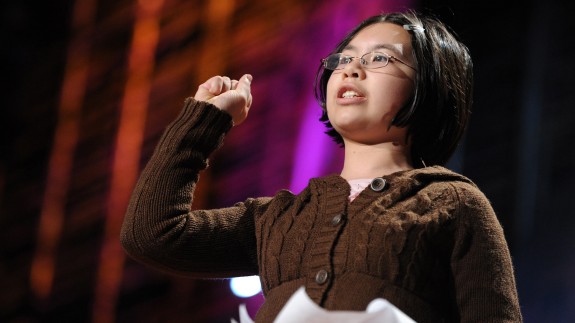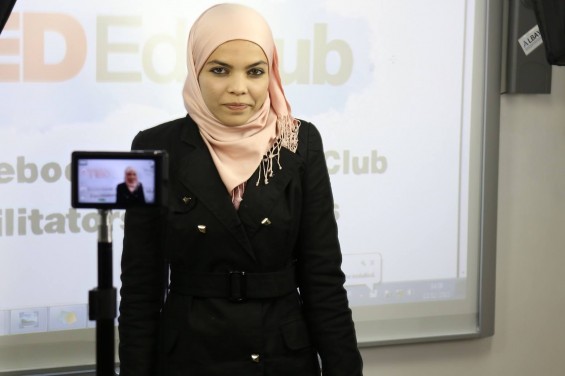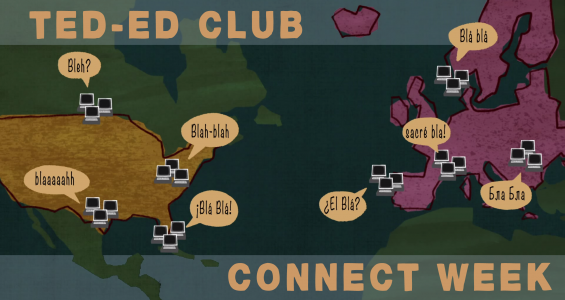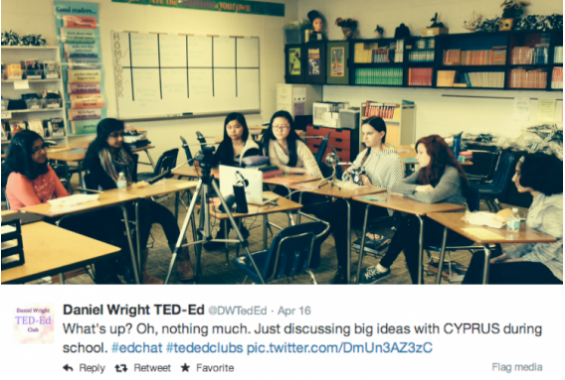
Advice from a young TED speaker: Start a TED-Ed Club at your school

If you watch the video of my TED Talk from 2010, you might see a confident 12-year-old, cracking jokes and striding around the stage in glasses that keep sliding down her nose. You won’t see me going home and crying, or starting every page in my journal with four words: “I feel sad today.”
When I was 12, TED-Ed Clubs didn’t yet exist — or I would have joined one! Instead, I divided life into two worlds: my tear-stained journal versus my practiced speeches onstage. A space to be vulnerable with others, for the larger purpose of sharing ideas? I didn’t have that in my high school. Today, TED-Ed Clubs provide students with that missing space — a place to share ideas without judgment.
If you asked me or my friends to sum up our high school experience in a word, we might have said “competitive.” While parents peered hawk-eyed over transcripts, students pulled all-nighters for extracurricular projects and eagerly posted on Facebook about acceptances to Ivy League colleges.
In every discussion I participated in during high school, there was a finite amount of time and thus a finite number of “points” to be earned for speaking up. This setup led to a desperate crush of raised hands among those who wanted A’s at any cost, a lot of comments about nothing — and a silent half of the room, filled with kids who had given up on speaking up. We learned to write about “safe” topics in our essays and college applications, because the cost of taking risks seemed too high. In clubs like Model UN and Speech and Debate, we always tried to win, to beat somebody else.
TED-Ed Clubs aren’t about that. By exposing members to great talks on subjects that are often of deep personal relevance, TED-Ed Clubs shine a light on old problems that need fresh perspectives. By creating a strong, supportive community of students in schools around the world, TED-Ed Clubs nurture global connections that celebrate student ideas. And of course, TED-Ed Clubs also train students in how to give TED-style talks.
As a TED-Ed summer intern, I’ve now watched TED-Ed Club Talks on everything from bullying to gender equality to heroism. There’s a glimmer of recognition in my eye when I watch some of these videos. Whenever a student chooses to reveal a hidden part of themselves in their idea worth spreading, I’m reminded of a moment at 15, when I finally chose to speak up about the two years of chronicling sadness in my journal and obey that oft-spoken dictum, “be yourself.”
What I didn’t realize in that moment is that it’s really hard to go from telling nobody to telling everybody. In the days, hours, and minutes leading up to my talk, I found myself plagued with self-doubt. I considered backing out and giving a “safer” speech. But I realized that this was the talk I needed to give. It marked the first time I hugged a friend for moral support before darting on-stage, the first time I hesitated to breathe life into certain words, the first time I was scared to look into audience members’ faces after concluding my talk with “Thank you,” the first time I cried because of a standing ovation.
Sometimes it’s easy to discount the value of a story. I was recently asked in an interview, “What achievement are you most proud of?”
I stumbled for a second as I tried to answer that question. I briefly wondered–is giving a talk really the same thing as an achievement? But then I remembered Massachusetts Governor Deval Patrick’s famous “Just Words” speech during his election campaign. He said in response to an opponent,
“Her dismissive point…is [that] all I have to offer is words. Just words. ‘We hold these truths to be self-evident, that all men are created equal’ — just words. Just words. ‘We have nothing to fear but fear itself.’ Just words. ‘Ask not what your country can do for you, ask what you can do for your country.’ Just words. ‘I have a dream’ — just words.”
It took me years, both of speaking, and of silence, to realize that the worth of my talks didn’t have to come from some line item on my resumé, flashy slides or grandiose audience pledges, but from the authenticity of my story. Start or join a TED-Ed Club, and you won’t get your achievements memorialized with heavy plaques or monetary rewards. But you will most definitely get, and give, “just words” — the kinds of words that bare your soul and your experience and earn you unconditional acceptance from your audience. The kinds of words that give you the power to change someone’s mind, introduce a new idea, and affect their life, as subtly as flowing water shapes the stones.
Shouldn’t every teenager get to have that experience?
More than 10,000 students are now sharing and presenting their ideas in TED-Ed Clubs around the world. Interested in starting a TED-Ed Club at your school? Find out more.




I’m only a Graduation student in kerala….
I just want to bring attention of my college authority to this club….
I love TED……
So please please…..
Please contact me anyone after 6PM on any day……
Hi!I want to be a Ted speaker.I am from Pakistan and we do not have any TED club here.How can I initiate one at my university?